Civil Liberties, Civil Rights, Human Rights, Political Prisoner, Supreme Court, U.S. Militarism, War Resister
Podcast: Play in new window | Download
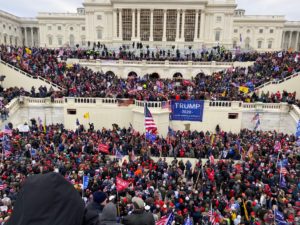
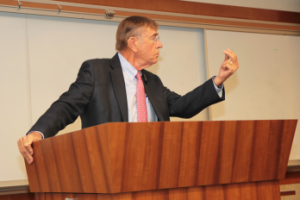
Federal Case Against Donald Trump
There is a great deal of speculation as to whether former president Donald Trump will eventually be indicted for crimes allegedly committed while he was the president. Well, in what might prove to be the most serious blow yet to Trump’s effort to stay out of jail, on March 28th, a federal judge ruled that both former president Trump and Atty. John Eastman who had advised him on how to overturn the 2020 election had most likely committed felonies, including obstructing the work of Congress and conspiring to defraud the United States. The ruling represents a highly significant breakthrough for the House committee investigating the January 6th attack on the Capitol. Judge David O. Carter found that the actions taken by Trump and Eastman amounted to “a coup in search of a legal theory.”
The judge’s ruling may be the House committee’s biggest win to date, as it suggests that the investigators have already built a case strong enough to convince a federal judge of Trump’s culpability in the January 6th insurrection.
Specifically, the ruling means that the House committee will now receive more than 100 emails related to the legal strategy proposed by Eastman to pressure Vice President Mike Pence not to certify electors from swing states when Congress convened on January 6, and thus to not certify the electoral vote. In making his ruling Judge Carter said, “Dr. Eastman and President Trump launched a campaign to overturn a democratic election, an action unprecedented in American history.”
Just how significant is this federal court ruling? What would a federal prosecutor need to show a judge and jury to be able to hold Trump liable for his actions around January 6th? And what about other actions by the former president while in office that many criminal law experts claim were illegal? And, of course, what role will politics ultimately play in determining whether Trump ever stands trial and is convicted by a jury?
Guest – Attorney Michael Tigar. Michael Tigar has been acting professor of law at UCLA, the Jos. D. Jamil Chair of Law at the University of Texas, and the holder of an endowed professorship at Washington College of Law. He is the author of numerous books, including Thinking About Terrorism: The Threat to Civil Liberties in Times if National Emergency and most recently, Sensing Injustice: A Lawyer’s Life in the Battle for Change. He has also represented such notable clients as The Washington Post, Rep. Ron Dellums, and Lynne Stewart.
—-
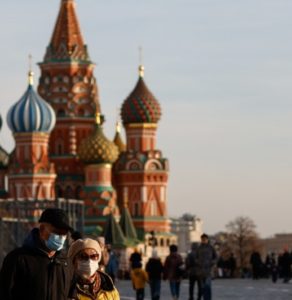
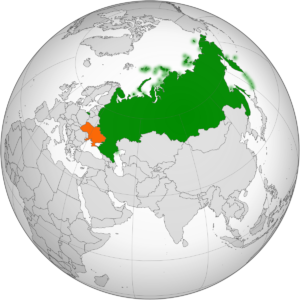
Russia, Ukraine War Analysis
And now to the matter of Russia’s war in Ukraine and the role of a free press in war time. Today, much is made of the fact that in Putin’s Russia, little or no accurate news of the war is reaching the Russian people. Instead, what they read in their newspapers or hear on their radios and see on their televisions is no more or less than what Putin wants them to read or see or hear. Meanwhile, here in the United States, the American people are provided with virtually non-stop newspaper and live eve-witness television coverage of the war in Ukraine; “coverage” that comes from reporters and others, often in real time, and on the ground in the middle of Putin’s war. Surely the dramatically contrasting way in which the Russian people and the American people are experiencing the war via the media must play a major role in how the two peoples feel about the war. So, too, how the US wars in Iraq and Afghanistan were covered by the US media must have played a role in how we, the American people, felt about those wars. Well, today we look at the role a nation’s media can play in shaping public support for or against a war that is being fought by that nation.
Guest – Norman Solomon is truly one of America’s true champions of a free and honest press, free and honest in war time as well as in peacetime. Mr. Solomon is one of the founders of F.A.I.R., or Fairness and Accuracy in Reporting, which has proved to be a powerful watchdog of the US media. Norman Solomon is also the co-founder of the internet news and opinion source, RootsAction.org. He is, of course, the author of too many articles to recite here. He is also the author of a number of books, including “War Made Easy: How Presidents and Pundits Keep Spinning Us to Death;” and “Made Love, Got War: Close Encounters with America’s Warfare State.”

——————————-
CIA Sponsored Terror, Civil Liberties, Criminalizing Dissent, Habeas Corpus, Human Rights, Iran, Supreme Court, Truth to Power, War Resister
Podcast: Play in new window | Download
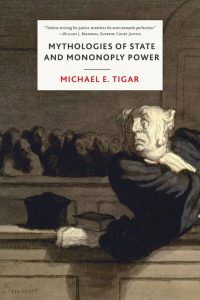

Human Rights Attorney Michael Tigar
As we enter into the new decade we look back at where we have been, legally speaking, and where we are headed.
2020 began with President Donald Trump illegally and recklessly ordering the assassination of top Iranian general Qassem Suleimani who was on a peace mission in Iraq at the time he was killed by a US drone.
Although assassination has been secretly used by the US government since the formation of the CIA in 1947, Barack Obama, Trump’s predecessor, began the illegal extra-judicial open assassination of people in what was called “targeted killings.“ This included American citizens.
With regard to deportations, the Obama administration set a record by deporting more than 3 million people. Trump has continued massive deportations but also has illegally frustrated and prevented people fleeing political repression from seeking asylum in America, separating children from families and caging them in a process that continues.
The Authorization for the Use of Military Force was voted on shortly after 9/11 to justify the bombing and invasion of Afghanistan. The AUMF has been used illegally to justify the presence of American troops in the Middle East since then. It was recently renewed.
The Patriot Act has also been renewed, allowing for massive US government surveillance of American citizens in the illegal derogation of their Fourth Amendment right to privacy democratic rights and the rule of law are in obvious, unprecedented, serious jeopardy.
Truth telling whistle blowing Australian journalist Julian Assange, in the most important first amendment civil liberty case, is about to be extradited from London to Virginia where he faces espionage charges. The issue is his right to be a journalist and our right to know. If convicted he will go to prison for life destroying investigative journalism in areas the government deems “national security.“
The peoples’ constitutional right to impeach a president is also in jeopardy. The Democratic party’s attempt to remove Donald Trump from office is sure to fail because of Trump and the Republicans’ refusal to honor the constitution and allow for a fair trial in the Senate.
Trump has appointed hundreds of reactionary judges to the federal trial and appellate benches. A woman’s right to control her own body, decided in the famous case of “Roe vs Wade”, will be decided by the Supreme Court whose ranks have been bolstered by two additional reactionary judges, Gorsuch and Kavanaugh.
The separation of church and state and the separation of powers are also in jeopardy.
Guest – Human rights attorney Michael Tigar, a veteran of 1960s activism. He’s appeared many times before the Supreme Court, taught law at three schools and has written numerous books including the now classic, Law and the Rise of Capitalism and most recently Mythologies of State and Monopoly Power.
——————————

——————————
CIA Sponsored Terror, Civil Liberties, Criminalizing Dissent, Crony Capitalism, Human Rights, Political Prisoner, Prison Industry, Supreme Court, Surveillance, Targeting Muslims, Truth to Power, War Resister
Podcast: Play in new window | Download
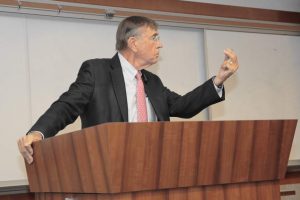

Attorney Michael Tigar: The Mythologies of State and Monopoly Power
The American criminal justice system is buttressed, sustained and perpetuated by various myths. These myths dominate legal ideology. The most important of these myths concern racism, criminal justice, free expression, workers’ rights, and international human rights. “Ordinary private law categories of property, contract, and tort perform the same social function,” Michael Tigar writes in his important new book “Mythologies of State and Monopoly Power.“
Michael Tigar has worked for more than 50 years with movements for social change as a human rights lawyer, law professor, and writer. He believes that busting these myths is the work of movement lawyers.
Noam Chomsky has written that “for anyone concerned with the rule of law, or more generally with the real significance of freedom and justice, Michael Tigar’s book is “a highly informed and carefully argued study that should be essential reading.”
The book is beautifully written, learned, and profoundly insightful. In a better world Michael Tigar would be a justice of the United States Supreme Court.
The Michael Tigar Papers Launch University of Texas
Tigarbytes.blogspot.com
Guest – Michael Tigar, emeritus professor of law at Duke University and at Washington College of Law. He has been a lawyer working on social change issues since the 1960s. He has argued numerous cases in United States Supreme Court and many Circuit Courts of Appeal. His books include “Law and the Rise of Capitalism”, “ Fighting Injustice ”, and the forthcoming Mythologist of State and Monopoly Power.“
——————–

——————–
CIA Sponsored Terror, Civil Liberties, Human Rights, NSA Spying, Surveillance, Truth to Power
Podcast: Play in new window | Download

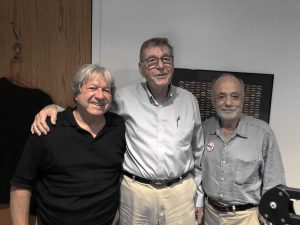
Michael E. Tigar On Challenges Lawyers Currently Face
Recently on Law And Disorder we interviewed Baher Azmy, Legal Director at the Center for Constitutional Rights, and National Lawyers Guild President Natasha Bannan. We were interested in their views of the challenges facing leftist lawyers and their movement clients face in these difficult times.
Attorney Jim Lafferty, the former head of the Los Angeles chapter of the National Lawyers Guild, who has a program on our sister station in Los Angeles, KPFK, joins me in the studio to cohost. We are going to speak for the entire hour with human rights attorney Michael Tigar.
Since the attacks on September 11, 2001, our democracy, however restricted at the time, has been even further shrunk by the growth of the national security state and the all knowing surveillance apparatus that has been set up. Moreover, the President, as the head of the executive branch of the government, has gathered unto to himself an unprecedented amount of power over the judicial and the legislative branches of the government. tigarbytes.blogspot.com/
Guest – Michael Tigar, emeritus professor of law at Duke University and at Washington College of Law. He has been a lawyer working on social change issues since the 1960s. He has argued numerous cases in United States Supreme Court and many Circuit Courts of Appeal. His books include “Law and the Rise of Capitalism”, “ Fighting Injustice ”, and the forthcoming Mythologist of State and Monopoly Power.“
———————

———————
Afghanistan War, CIA Sponsored Terror, Civil Liberties, Criminalizing Dissent, FBI Intrusion, Gaza, Guantanamo, Habeas Corpus, Human Rights, Military Tribunal, NSA Spying, Political Prisoner, Surveillance, Targeting Muslims, Torture, War Resister
Podcast: Play in new window | Download
Updates:
- Attorney Michael Smith Remembers 69th Anniversary of U.S. Dropping A-Bombs On Japan
- Atomic Diplomacy: Hiroshima and Potsdam: The Use of the Atomic Bomb and the American Confrontation with Soviet Power
—–

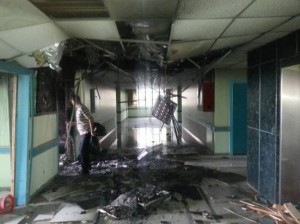
The Logic of Israeli Violence
Ongoing reports of Israel engaging in senseless cruel violence against Palestinian people in Gaza throughout Operation Protective Edge is not a random bombing campaign but a strategic war experiment in colonial management as Greg Shupak explains in his recent article The Logic of Israeli Violence. Shupak points out the attacks on civilians fleeing for shelter, the bombing of the medical infrastructure, fishing boats and wheat mills, killing Arab speaking journalists are in the larger plan of ethnicide and to render the Palestinian people dependent. His article reminds readers that there is a measured plan of attack to systematically erase the historic memory of the Palestinian society.
Greg Shupak:
- There’s good reason to believe according to some reporting by 97 Magazine and Max Blumenthal that the Israeli security forces knew quite perfectly well the teens were almost certainly killed as soon as they were abducted and yet they carried on this charade of pretending that they could be rescued in some way.
- Rocket fire from Hamas didn’t start until after Israel carried out strikes within Gaza, and carrying out various forms of killing Palestinian civilians and or people they described as militants.
- The rockets were a response to Israeli violence.
- Israeli propaganda has insinuated that these tunnels have in fact been used to kill Israeli civilians or that they may well be, but that simply has not happened.
- If the aim was to destroy tunnels, Egypt which is being ruled by a brutal regime, in its own right, was able to get rid of these tunnels without killing huge numbers of civilians.
- Israel’s aim vis a vis Gaza is to isolate Palestinians there from the outside world render them dependent on external benevolence and at the same time absolve Israel of responsibility toward them.
- The thesis I put forth about the current violence of Operation Protective Edge, is that one way Israel is attempting to achieve that goal, that goal of Jewish supremacy in historic Palestine with as much land as possible and as few Palestinians as possible is to aim to obliterate Palestinians as a people with the capacity to live independently in their homeland.
- The pattern of Israeli violence . . . is not only to kill and maim Palestinians but to impede their capacity to live autonomously in historic Palestine.
- It’s a settler colonial project.
- This is part of a longer term pattern. If you look at the work of Dr. Sarah Roy of Harvard she has documented extensively what she calls the deliberate de-development of the Gaza Strip economy. She has warned that Gazans are at risk for mass starvation.
- Five hospitals have been shut down. 24 health facilities have been damaged.
- We also that there’s been direct strikes on hospitals from Israeli fire.
- The ability of Palestinians to care for themselves has very much been undermined.
- Two thirds of Gaza’s wheat mills are inoperative, 3000 of its herders are in need of animal feed. We’ve seen fishermen attacked, we’ve seen attacks on agricultural sites, these are all part of those processes that Sarah Roy has talked about in the longer term.
- If religion is way for a cultural group to understand its identity then attacking the cultural institutions of that religion are ispo facto an attack on the people to have an identity.
- When you attack an educational institution you undermine the ability of a people to educate their young, to train them for future work, to train them to think critically, to develop artists, and inventors and so on.
- This to me is a very significant way for stifling a cultural groups independent existence.
- At its simplest, Israel can be seen as a giant military base for the United States.
Guest – Greg Shupak, a writer, activist and PhD candidate at the University of Guelph’s School of English and Theatre Studies. He teaches Media Studies at the University of Guelph, Ontario, Canada.
——–
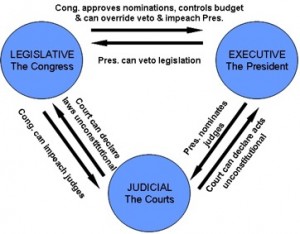

The National Security State: The End of Separation of Powers
Retired Professor of Law from Duke University Michael Tigar joins hosts to talk about his recent article The National Security State: The End of Separation of Powers published in the latest Monthly Review Magazine. Michael has explained how the Executive branch of government has come to dominate both the Judicial and Legislative branches of the United States government. Attorney Michael Tigar has been working on social issues for many years, his books include Law and The Rise of Capitalism, Fighting Injustice, and Thinking About Terrorism: The Threat To Civil Liberties In Times of National Emergency.
Attorney Michael Tigar:
- The basic principle of constitutional government that is established in our Constitution is that the actions of the legislative and executive branches, particularly the executive branch, are always reviewable by independently appointed judges and that the legality of whatever the executive branch does harms any protected interest, citizen or otherwise ought to be reviewable in the courts of the United States.
- The main thing about this is the harm to the judicial branch is in a real sense a self inflicted wound.
- That is to say judges confronted with assertions of executive power have proven inadequate to the task of restraining exercises of executive power
- We recall the massive illegality of the Japanese relocation at the beginning of the Second World War.
- It is now been shown that the premise upon which that relocation took place confining Japanese-Americans in concentration camps was false.
- At the time the Constitution was being debated Patrick Henry opposed the adoption of the Constitution on the ground that the ideal that independent judiciary could act as an effective check upon the exercise of executive power particularly military power was bound to be dis-proven in history.
- Law is legal ideology. That is to say its erected around social relations. In every time of recorded history there is a sense in which the formal guarantees that rules of law make about individual rights are simply lies the regime tells the people in order to sustain itself.
- That was the burden of book I wrote called Law and The Rise of Capitalism.
- The ideal that you rally people to the cause of social change by promising them liberty is also not new.
- The Cherokee people of Georgia read the Constitution and they said Aha, the Constitution guarantees that any group or individual can exercise certain social rights.
- So they drafted a Constitution for their nation and set up institutions then they brought suit against the state of Georgia to enforce these rights, that the letter of the American Constitution guaranteed that.
- What did Chief Justice Marshall say? What a minute, these are inferior and subject people. When the Constitution gives the right to all people, persons, citizens whatever, to bring lawsuits under Article 3 and to bring them to us, it wasn’t talking about these people.
- Michael Ratner you and others, courageous lawyers who have been struggling to get reviewablility of unlawful executive action should not give up the fight.
- The kinds of effort you make deserve support and turn out in historic context to be important.
- Historically the role of lawyers has been to articulate people’s claims for justice.
- What Edward Snowden and Julian Assange have done is reveal to the world fundamental defects in the way that the American political society has been operating and yet rather than saying thank you in some form of another, the government is hell-bent on prosecuting them.
Guest – Michael Tigar, a research professor of law. He holds expertise in Constitutional Law; Supreme Court; French legal system; criminal law and procedure; human rights. He is fluent in French. Tigar represented Terry Nichols in the Oklahoma City bombing trial. One of the most renowned lawyers in the country today, he has argued seven cases before the U.S. Supreme Court and more than 100 appellate cases. Tigar has written extensively about litigation, aspects of trial practice, criminal law, the death penalty, and the role of the criminal defense lawyer. His books include Fighting Injustice (ABA, 2002); Federal Appeals: Jurisdiction and Practice; and Examining Witnesses. In addition, he has written several plays about famous trials. Throughout his career, Tigar has been active in pro bono cases, the American Bar Association, continuing legal education programs, and international human rights. During the apartheid period, he went to South Africa to train black lawyers. Prior to joining AU, Tigar served as a professor at the University of Texas Law School.
—————————————————————————————–

Please help support Law and Disorder, the show is now a sponsored project of Fractured Atlas, a non-profit arts service organization. Contributions for the charitable purposes of Law and Disorder must be made payable to Fractured Atlas only and are tax-deductible to the extent permitted by law.












